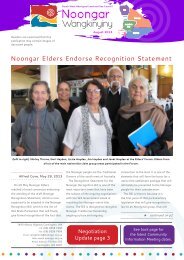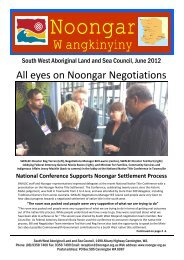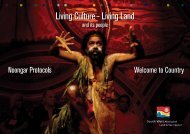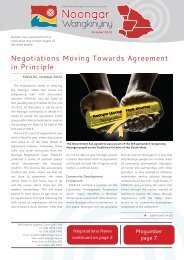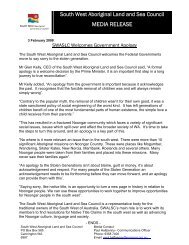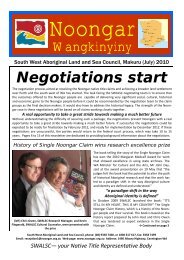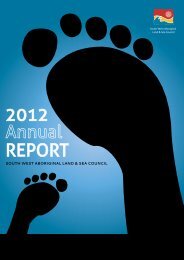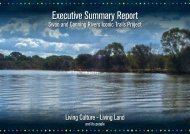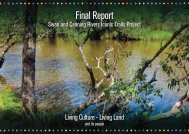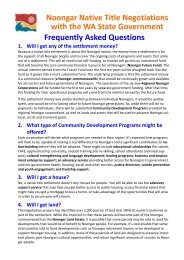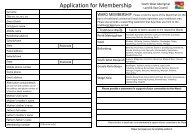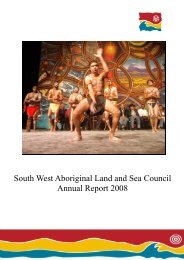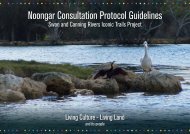Timeline Poster - South West Aboriginal Land & Sea Council
Timeline Poster - South West Aboriginal Land & Sea Council
Timeline Poster - South West Aboriginal Land & Sea Council
You also want an ePaper? Increase the reach of your titles
YUMPU automatically turns print PDFs into web optimized ePapers that Google loves.
Connection<br />
to Country<br />
Produced by<br />
<strong>South</strong> <strong>West</strong> <strong>Aboriginal</strong> <strong>Land</strong> & <strong>Sea</strong> <strong>Council</strong><br />
<strong>South</strong> <strong>West</strong> <strong>Aboriginal</strong><br />
<strong>Land</strong> & <strong>Sea</strong> <strong>Council</strong><br />
1490 Albany Highway<br />
Cannington WA 6107<br />
Ph: 08 9358 7400<br />
Fax: 08 9358 7499
Connection<br />
to Country 2006<br />
<strong>Aboriginal</strong> people occupied<br />
Australia for at least 40,000<br />
to 60,000 years before<br />
the first British colony was<br />
established in Australia. In the<br />
<strong>South</strong> <strong>West</strong> of WA (where the<br />
British claimed sovereignty in<br />
1829) archaeological evidence<br />
establishes that the Noongar<br />
people have lived in the area and<br />
had possession of tracts of land on<br />
their country for at least 45,000<br />
years. The Noongar people are one<br />
of the largest <strong>Aboriginal</strong> cultural<br />
blocks in Australia and there is no<br />
evidence that there has been any<br />
other group than Noongar in the<br />
<strong>South</strong> <strong>West</strong>.<br />
1993<br />
1993 Native Title Act. Following<br />
Mabo in 1992 the Native Title Act<br />
of 1993 led to the recognition of<br />
the legal concept of Native Title in<br />
1983 1995<br />
the Australian legislative system.<br />
1997<br />
2002<br />
1983. Under pressure from<br />
1985<br />
The Native Title Act attempted 1995. Native Title claims in<br />
1998<br />
<strong>Aboriginal</strong> groups, particularly<br />
to clarify the legal position of<br />
the <strong>South</strong> <strong>West</strong> were initially<br />
Noongar people, in <strong>West</strong>ern<br />
1992<br />
1996<br />
landholders and the processes administered by the <strong>Aboriginal</strong><br />
1997. Despite this in Noongar<br />
Australia to enact some form of 1985. In 1985 a <strong>Land</strong> Rights<br />
that must be followed for Native Legal Service of <strong>West</strong>ern<br />
Country there was a rush to lodge 1998. Due to acute funding<br />
<strong>Land</strong> Rights similar to the Northern Bill was proposed which would<br />
Title to be claimed, protected and Australia, following agitation from 1996. Wik Decision. The Mabo native title claims and 78 different restrictions and simple<br />
Territories 1975 <strong>Land</strong> Rights Act<br />
appointed a Queens Counsel Paul<br />
<strong>Sea</strong>men to investigate.<br />
enable <strong>Aboriginal</strong> people and<br />
Noongar people to hold land in<br />
freehold, to own it.<br />
1992. This issue was to change<br />
altogether with the Mabo (No.2.)<br />
High Court Decision.<br />
recognised through the courts.<br />
However the process was loaded<br />
against <strong>Aboriginal</strong> people.<br />
local Noongars who said that<br />
their community was not being<br />
represented.<br />
decision created uncertainty,<br />
particularly for pastoralists who<br />
held pastoral leases.<br />
individual family claims were<br />
lodged over the <strong>South</strong> <strong>West</strong> with<br />
the National Native Title Tribunal.<br />
manageability (NTRB’s have very<br />
few staff) it was impossible to run<br />
all of these claims.<br />
2002. Problems with the Noongar<br />
<strong>Land</strong> <strong>Council</strong> constitution saw<br />
them being replaced by the<br />
<strong>South</strong> <strong>West</strong> <strong>Aboriginal</strong> <strong>Land</strong><br />
and <strong>Sea</strong> <strong>Council</strong> as Native Title<br />
representative Body representing<br />
all Noongar people.<br />
2003<br />
2005<br />
2005. The WA Government would<br />
not negotiate with SWALSC and<br />
insisted a trial to ascertain Native<br />
Title over the Perth Area take<br />
place. SWALSC had to prepare the<br />
SNC for trial. This was an intensive<br />
period of activity with very few staff<br />
performing an enormous task.<br />
2006 ‘Noongar’. On 19th Sept 2006 the Federal Court brought<br />
down a Historic judgment in favour of Noongar Native Title over the<br />
Perth metropolitan area, it is known as Bennell v State of <strong>West</strong>ern<br />
Australia [2006] FCA 1243. Justice Wilcox found that Native Title<br />
continues to exist within an area in and around Perth. This is the<br />
first judgment which recognised Native Title over a capital city and<br />
its surroundings.<br />
It is important not to understate the importance of this victory.<br />
Had Noongar people been unsuccessful in this instance and<br />
the judgement not gone in their favour years of work, hope and<br />
aspirations of the Noongar people would have been wasted and<br />
they may have had to go back to square one and start all over<br />
again with their country possibly never recognised. This was<br />
the bedrock from which Noongar people were acknowledged<br />
as Traditional owners of the <strong>South</strong> <strong>West</strong> and they were now in a<br />
strong position to negotiate with the State Government of WA.<br />
2007<br />
2008<br />
2008. On 23 April 2008 the Full<br />
Bench of the Federal Court upheld<br />
parts of the appeal by the <strong>West</strong>ern<br />
Australian and Commonwealth<br />
governments against Justice<br />
Wilcox’s judgment.<br />
2009<br />
2009. Despite the appeal result<br />
Noongar people, represented<br />
through SWALSC, had made<br />
critical progress with the State<br />
Government making the historic<br />
decision not to pursue Noongar<br />
Native Title through the Courts but<br />
rather through negotiations.<br />
2010<br />
2010. A Heads of Agreement with<br />
The State of <strong>West</strong>ern Australia is<br />
signed with SWALSC CEO Glen<br />
Kelly and the Noongar Executive.<br />
Noongar people spoke their own<br />
language and had their own laws<br />
and customs. Those laws and<br />
customs were characterised by<br />
a strong spiritual connection to<br />
‘country’; caring for the natural<br />
environment and for places<br />
of significance; performing<br />
ceremonies and rituals; collecting<br />
food by hunting, fishing and<br />
gathering; providing education<br />
and passing on law and custom<br />
through stories, art, song and<br />
dance. Noongar people not only<br />
survived European Colonisation<br />
but thrived as family groups<br />
and sought to assert their rights<br />
to their land on their country.<br />
Formalising this in parliament<br />
was not to occur for some 150<br />
years after Europeans arrived.<br />
The ‘<strong>Sea</strong>man Report’ as it was<br />
known contained vast amounts of<br />
evidence from Noongar people and<br />
recommended a whole range of<br />
reforms relating to land tenure and<br />
resources revenue rights, access<br />
to significant sites and protection<br />
of sites. The government of the day<br />
rejected almost all of the findings.<br />
It was not supported by the<br />
Government of the day and<br />
the Bill would never reappear.<br />
Unlike other states the <strong>West</strong>ern<br />
Australian government has<br />
historically been hostile to<br />
<strong>Aboriginal</strong> <strong>Land</strong> Rights and has<br />
never supported or enacted any<br />
<strong>Land</strong> Rights legislation.<br />
Only in 1992 was the assumption<br />
that Australia was terra nullius or<br />
unoccupied by <strong>Aboriginal</strong> people<br />
before European arrival rejected<br />
by the High Court.<br />
Photographs courtesy SWALSC, Toni Wilkinson, and Margaret Owen.<br />
Funded by the Australian Government Department of Families, Housing, Community Services and Indigenous Affairs.<br />
They had to prove - in<br />
aggressive Federal Court cases<br />
if necessary – that they still<br />
had native title. The onus was<br />
on <strong>Aboriginal</strong> people to provide<br />
evidence and proof of their<br />
connection to country rather<br />
than any government prove<br />
they did not. Claimants were<br />
represented through Native Title<br />
Representative Bodies (NTRB)<br />
such as SWALSC. To make<br />
matters even worse native title<br />
was extinguished on freehold<br />
or private land making it unclaimable.<br />
This is particularly true<br />
in the ‘heavily settled’ area of<br />
the <strong>South</strong> <strong>West</strong> of WA where less<br />
than 4% of native title still exists<br />
in the entire <strong>South</strong> <strong>West</strong>.<br />
Over 200 Noongars met and<br />
decided by a vote that a <strong>Land</strong><br />
<strong>Council</strong> would be established<br />
for the south west and it would<br />
actively seek to obtain NTRB<br />
status. Following this the<br />
Noongar <strong>Land</strong> <strong>Council</strong> (NLC) was<br />
established in 1995 as NTRB for<br />
Noongar People in the <strong>South</strong> <strong>West</strong><br />
of <strong>West</strong>ern Australia initially with a<br />
staff of three.<br />
That decision led to amendments<br />
to the Native Title Act (by the<br />
Native Title Amendment Act) in<br />
1998 which provided security of<br />
tenure to non-Indigenous holders<br />
of pastoral leases and other<br />
land title, where that land might<br />
potentially be claimed under the<br />
Native Title Act. <strong>Aboriginal</strong> people<br />
were further disadvantaged by<br />
this change.<br />
At this time there was informal<br />
support for a Single Noongar Claim<br />
to represent all Noongars though<br />
this did not develop until later.<br />
A situation would have developed<br />
where some claims were run<br />
and others would have been<br />
abandoned. This was considered<br />
most unfair (in an already unfair<br />
system) where some Noongar<br />
people could possibly have native<br />
title and most not. Most of the<br />
78 claims were withdrawn and<br />
replaced by six communal claims<br />
which remain to this day.<br />
Because of a desire to represent<br />
Noongar people as the ‘One<br />
Nation’ they have always been the<br />
formal move the Single Noongar<br />
Claim (SNC) was starting to take<br />
shape. Community meetings in<br />
support of the SNC were carried<br />
out all over the <strong>South</strong> <strong>West</strong>.<br />
2003. In September 2003 the<br />
SNC was lodged with the Federal<br />
Court of Australia though the six<br />
underlying claims remained in<br />
place.<br />
Noongar Native Title Journey<br />
A Federal Court Trial took place<br />
before Justice Murray Wilcox<br />
where he heard evidence from<br />
Noongar witnesses all over the<br />
<strong>South</strong> <strong>West</strong> on their country.<br />
Witnesses were cross examined<br />
by the <strong>West</strong>ern Australian<br />
Government. The State of WA not<br />
only denied there was a Single<br />
Noongar People but insisted that<br />
the word Noongar itself was a<br />
fabrication and that the Noongar<br />
people of the <strong>South</strong> <strong>West</strong> had<br />
actually come in from elsewhere.<br />
This was offensive to all Noongars.<br />
Wilcox’s judgement validates the SNC as he found that the<br />
laws and customs governing land throughout the whole Single<br />
Noongar Claim (viewing Perth as simply a part of the greater<br />
<strong>South</strong> <strong>West</strong>) were those of a single community. The Noongar<br />
claimants shared a language and had extensive interaction with<br />
others in the claim area. Importantly, Justice Wilcox found the<br />
Noongar community had continued to exist and still practice<br />
many of their laws and customs despite the disruption resulting<br />
from people being forced off their land and moved as a result of<br />
white settlement and later Government policies.<br />
2007. Despite this victory the<br />
State and Commonwealth<br />
aggressively appealed the<br />
decision arguing that Native Title<br />
couldn’t possibly still exist of a<br />
capital city and in April of 2007<br />
an Appeal was heard in Perth.<br />
The judges did not however agree<br />
that there was no native title over<br />
Perth. They did not also dispute<br />
the existence of a Single Noongar<br />
People. This was an important<br />
victory from this result.<br />
1490 Albany Highway<br />
Cannington WA 6107<br />
Ph: 08 9358 7400<br />
Fax: 08 9358 7499<br />
In supporting these negotiations<br />
the WA Government recognised<br />
the Noongar people’s traditional<br />
connection to the southwest of<br />
WA. This was unthinkable a few<br />
years before.<br />
<strong>South</strong> <strong>West</strong> <strong>Aboriginal</strong><br />
<strong>Land</strong> & <strong>Sea</strong> <strong>Council</strong>



